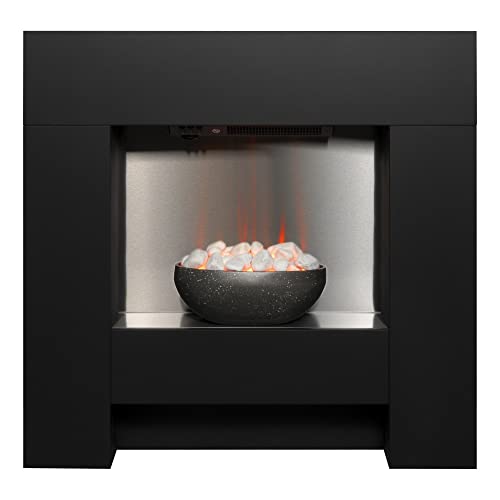Why We Our Love For Best Fireplace (And You Should Also!)
The Best Fireplaces: A Comprehensive Guide for Homeowners
Fireplaces have actually long been a precious feature in homes, supplying both warmth and a welcoming environment. They come in different styles, sizes, and fuel types, allowing property owners to select one that fits their individual visual and heating requirements. This short article explores the very best fireplaces, highlighting essential features and factors to consider to assist you make a notified choice.
Types of Fireplaces
Understanding the various kinds of fireplaces is vital in selecting the best alternative for your home. Below are the most commonly utilized fireplaces:
Wood-Burning Fireplaces
- Benefits: Traditional appeal, natural atmosphere, and effective heating.
- Drawbacks: Requires routine upkeep, ash disposal, and undergoes regional regulations regarding emissions.
Gas Fireplaces
- Benefits: Convenient, clean-burning, and simple to run.
- Downsides: Requires a gas line, can be more pricey to set up at first.
Electric Fireplaces
- Advantages: Easy setup, low upkeep, and the safest alternative for homes with kids or family pets.
- Disadvantages: Lack the authentic feel of wood or gas flames, might not warm large areas successfully.
Pellet Stoves
- Advantages: Eco-friendly, efficient, and offer a stable heat output.
- Drawbacks: Requires electrical energy to operate, and pellet supply can be restricted in some areas.
Ethanol Fireplaces
- Advantages: No chimney needed, portable, and environmentally friendly.
- Downsides: Generally less effective for heating.
A Comparison of Fireplace Types
Type
Setup Cost
Running Cost
Heat Output
Upkeep
Ecological Impact
Wood-Burning
₤ ₤
₤
High
High
Moderate
Gas
₤ ₤ ₤
₤ ₤
Medium-High
Low
Moderate
Electric
₤
₤ ₤
Low
Really Low
Low
Pellet
₤ ₤
₤
Medium
Medium
Low
Ethanol
₤ ₤
₤ ₤ ₤
Low
Extremely Low
Very Low
Leading Considerations When Choosing a Fireplace
When you're in the marketplace for a brand-new fireplace, keep the following consider mind to guarantee you choose the best one for your home:
Purpose and Functionality: What do you desire your fireplace to do? Is it for heating or aesthetic appeals? This will guide your choice substantially.
Space Availability: Measure the area where you want to install the fireplace. Ensure the selected type fits without overwhelming the area.
Fuel Source: Assess the accessibility and expense of various fuel sources in your location to prevent unanticipated expenses.
Installation Complexity: Some fireplaces may require significant modifications to your existing home structure.
Building Regulations and Regulations: Be aware of regional laws concerning ventilation, security, and emissions, as these can affect your fireplace option.
Visual Appeal: The design and design of a fireplace can work as a centerpiece or complement the existing decoration, so select one that enhances your home's total aesthetic.
Benefits of a Fireplace
Adding a fireplace to your home manages many benefits:
Enhanced Aesthetic Appeal: A fireplace can elevate the design of any space, creating a cozy and inviting atmosphere.
Increased Home Value: A well-installed fireplace can add significant worth to your home, making it attracting prospective buyers.
Energy Efficiency: Modern fireplaces, especially gas and pellet stoves, can provide reliable heating while reducing energy expenses.
Emergency Situation Heat Source: In cases of power failures, a wood or gas fireplace can work as a trustworthy heat source.
Celebration Space: Fireplaces typically end up being the focal point for gatherings, promoting heat and convenience during friend or family' get-togethers.
Regularly Asked Questions (FAQs)
**Q: How much does it cost to install a fireplace?A: Installation costs can vary considerably based upon the type of fireplace, structural requirements, and labor expenses. Basic electric fireplaces may cost around ₤ 300, while custom-made wood or gas fireplaces can run from ₤ 3,000 to upwards of ₤ 10,000. Q: Are electric fireplaces safe?A: Yes, electric
fireplaces are usually safe.
They do not produce carbon monoxide gas and have no open flames. They often consist of safety functions like automated shut-off mechanisms. Q: How frequently ought to I have my chimney cleaned?A: If you use a wood-burning fireplace, it's recommended to have your chimney cleaned up a minimum of as soon as a year
**
to prevent creosote buildup, which can lead to chimney fires. Q: Can I install a gas fireplace myself?A: It's not advisable to install a gas fireplace without professional assistance due to the complexities associated with gas
lines, ventilation, and safety guidelines. Q: What are the very best kinds of fuel for wood-burning fireplaces?A: The best fuel choices consist of well-seasoned woods like oak, maple, or hickory, as they burn hotter and cleaner compared to softwoods. Picking the best fireplace for your home
includes considering many factors, from aesthetic appeals to function and security. Each type of fireplace has its special advantages and possible disadvantages.
Understanding these elements, in addition to your individual heating needs and spending plan restraints, will direct you in making a notified decision. Ultimately, a fireplace can supply not just warmth but likewise an abundant ambiance, transforming your home into a welcoming sanctuary. 